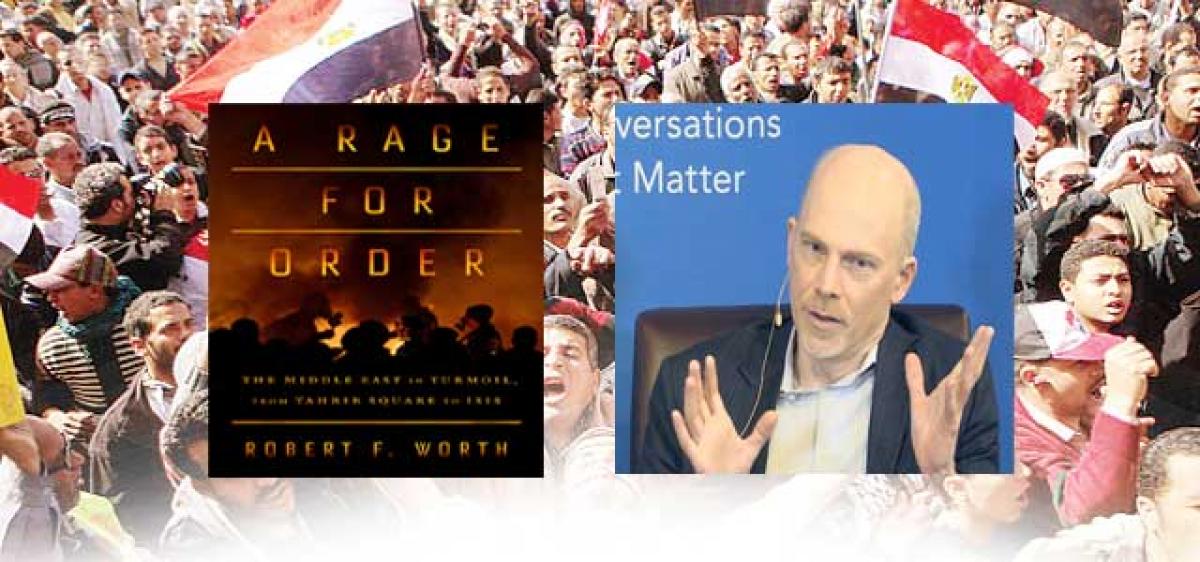Live
- Chess Olympiad: India script history with two gold medals
- Celebrity Couple Srikanth Kidambi and Shravya Varma Visit Gowri Signatures Store
- BJP failed to address civic issues of Gurugram: Raj Babbar
- Killing of fishermen in sea stopped after Modi govt assumed office: Union Minister L Murugan
- PM Modi’s rally venue Nassau Coliseum has hosted legendary entertainers & politicians
- Grand Alumni Reunion Celebration
- Union Minister Scindia seeks action in Tirupati Balaji prasad scandal
- Punjab Government is likely to reshuffle its cabinet on 23rd September, 4-5 new minister will include
- Forum in Thailand calls for boosting globalisation of TCM
- Proteas hoping to 'go one step further' and lift Women's T20 WC: Wolvaardt
Just In

Robert F Worth’s book, ‘A Rage for Order: The Middle East in Turmoil, from Tahrir Square to ISIS’ published by Pan Macmillan is based on his long writings on the Arab Uprising that he covered for the New York magazine.
Robert F Worth is a senior American journalist, the former head of New York Times, Beirut Bureau, and had extensively covered the Arab Uprising of 2011. A chat with him on the sidelines of JLF 2017 turned out to be a revelation of how a promising uprising for change, ignited by the new-age social media, frittered away, and was reduced to yet another event in the history of the Middle East... a saga that continues to find resonance in the digital era
Robert F Worth’s book, ‘A Rage for Order: The Middle East in Turmoil, from Tahrir Square to ISIS’ published by Pan Macmillan is based on his long writings on the Arab Uprising that he covered for the New York magazine.
He shares, “I was initially going to focus on one country since the uprisings were initially playing out to be different in each country and it wouldn’t have made sense to write one book of them all. I had spent a lot of time in Yemen, and wanted to write about it.
I changed my mind in 2013 because by that time there was a major coup in Egypt, and I thought there was polarisation taking place in these Arab countries that finally justified a book that would include them all – Egypt, Tunisia, Lybia, Syria and Yemen.
I did not include Bahrain even though there was a huge movement there as it was quelled soon enough and, also because it was a very different kind of a country with a very different past.
Elaborating on the nature of Arab Uprising he explains, “What we saw was an uprising of people, who were young, educated, who seemed so idealistic and appealing, whose consciousness of politics came from the web. It was very media friendly and they have not been saying the things that for so long have been chestnuts of Arab rhetoric.
Like - we must destroy Israel and so on that many of the protestors may have believed in but were sick of having that used as a ruse when they wanted to have internal reform. However the trouble with the uprising was that it ultimately represented a very thin segment of the society that was still deeply divided.
And without the kind of institutions that you need to build pluralism (that the Arab world continues to lack) it was difficult to maintain the momentum of protest.”
Would it have helped if there were proper leaders – “In fact, not having a leader helped them succeed initially,” says Robert. “They couldn’t locate a single leader or they would have killed him as it was done in the previous rebellions in the Arab world. They were leaderless and emerged like Amoeba from the web.
In Libya, there was a set of leaders that went and convinced France and the US to intervene. There was a feeling that these guys were trustworthy. Just 21-year-old kids - they formed the nucleus of the new leadership class. The trouble was that even they were unable to triumph over the fractured nature of Libya.
Gaddafi has destroyed institutions, and the rebellion strengthened the factions around the country. Ideally the solution would have been to violently disarm the various factions. In 2011, when the country has been through a painful civil war – people weren’t up for that kind of an effort.”
The failure of the Arab Spring, which was inevitable as the way things stood in Middle East, inadvertently led to the rise of ISIS. Robert Worth agrees, “The ISIS themselves agreed to this. Syrian Uprising had been a great boon to them.
Suddenly, they had a collapsing State next door. And they had been saying it for years that – we need collapsing States because that is where we build our own network - like a maggot burrowing into a dead body. This was all very good for them.
They almost succeeded in Tunisia; but failed as the country already had an alternative to Al-Qaida and other Jihadist groups – ‘a mainstream Muslim Movement’. It was not the case with other countries. In Yemen, it was a stew with all kinds of radical groups and ideologies and there was legitimate state that could have pushed them back.”
Robert F Worth, who loved living in Libya and Syria, says it has become extremely difficult for journalists to report from the Middle East. “It’s gotten a lot more difficult in the past few years.
I talked to old friends, who were reporting in the 1970s in the Middle East. There were obstacles then, but nothing compared to the time I came to the region. There were places that I couldn’t go. There were Islamist groups in places and anti-American propaganda too has been increasing.
Lebanon is still accessible to journalists, but you better be on good terms with Hizbullah, if you want to get into southern Lebanon. Similar kinds of challenges exist in various degrees in other countries.
Yemen and Syria, where I loved to spend time pre-2011 is still accessible, but your access, once you get inside, is very limited because of the conflict. I think it’s terribly sad that many of the people of these countries flee giving up what they have.
And more importantly, it’s harder for people to find out what’s going on there, because the journalists who go there may even be killed.”

© 2024 Hyderabad Media House Limited/The Hans India. All rights reserved. Powered by hocalwire.com







